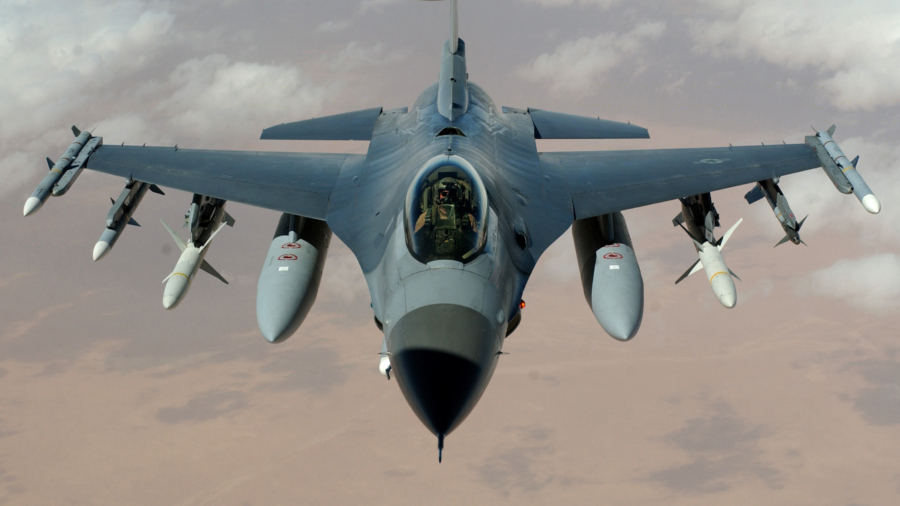A U.S. F-16 fighter jet shot down a combat drone belonging to Turkey, a NATO ally, on Thursday morning over northern Syria.
Pentagon press secretary Gen. Pat Ryder announced what he repeatedly described as a “regrettable incident” during a press conference on Thursday afternoon.
U.S. forces observed several Turkish drones conducting armed strikes. The Turkish drones were reportedly operating in Al Hasakah, an area of northern Syria that U.S. forces had declared to be restricted. The unmanned aerial vehicles reportedly flew within a kilometer of U.S. forces operating in the area.
At around 11:30 a.m., an armed Turkish drone again entered the restricted airspace, heading toward U.S. forces operating in the area. Gen. Ryder said U.S. forces relocated to bunkers for safety reasons, and local U.S. commanders determined the Turkish drone posed a potential threat.
“U.S. F-16 fighters subsequently shot down the [unmanned aerial vehicle] in self-defense at approximately 11:40 a.m. local time,” Gen. Ryder said.
The Pentagon spokesman said no U.S. forces were harmed as a result of the incident.
Gen. Ryder said U.S. Secretary of Defense Lloyd Austin spoke by phone with his Turkish counterpart to discuss Turkish military operations carried out in proximity to U.S. forces in Syria.
“Based on the discussions with the Turkish defense minister and post-shootdown analysis, we have no initial indications that Turkey was intentionally targeting U.S. forces,” Gen. Ryder continued. “Again, it was a regrettable incident. And we will continue to keep those lines of communication open to hopefully prevent these types of incidents from happening.”
Counterterrorism Operations in Syria
The United States and its NATO allies have been deployed to Syria since 2014 in an effort to defeat the ISIS terrorist group. Turkey, which is located on Syria’s northern border, has participated in these counter-ISIS operations, but has also carried out military operations against Kurdish forces in the region.
Turkey and the United States have both declared the Kurdistan Workers Party (PKK) to be a terrorist organization, but the NATO allies are not on the same page about other primarily Kurdish paramilitary forces in Syria, such as the People’s Defense Units (YPG). The YPG makes up a significant component of the Syrian Democratic Forces (SDF), which the United States has assisted throughout its operations in Syria.
The distinction between the PKK, YPG, and SDF has become a contentious issue for the NATO allies operating in Syria. The Turkish government considers the YPG to be a terrorist organization aligned with the PKK. In contrast, the United States has not designated the YPG as a terrorist organization, and has worked with the group in the past.
The Turkish government renewed strikes against suspected PKK targets this week, after it linked the group to a suicide bombing in the Turkish capital Ankara on Oct. 1.
“All infrastructure, superstructure, and energy facilities that belong to the PKK and the YPG, especially in Iraq and Syria, are legitimate targets of our security forces, armed forces, and intelligence units from now on,” Turkish Foreign Minister Hakan Fidan announced on Wednesday.
When asked about Mr. Fidan’s comments during a Wednesday press conference, U.S. State Department principal deputy spokesperson Vedant Patel said it is the U.S. position that the YPG and PKK are separate entities.
Gen. Ryder did not provide details about the targets of the Turkish military’s drone strikes on Thursday, and did not specify whether YPG or SDF elements were present in the restricted area the United States had declared around Al Hasakah.
The Pentagon spokesman did not specify whether Mr. Austin had gained assurances from his Turkish counterparts that Turkish military operations in Syria would not conflict with U.S. operations in the future, but insisted there was a shared understanding between both NATO members.
“The tone of the conversation was, again, an understanding that we are two close NATO allies and we will keep the lines of communication, that we don’t want to put our forces—each other’s forces—in harm’s way, but also again, emphasizing the importance of the defeat-ISIS mission,” Gen. Ryder said. “And that was a sentiment expressed on both sides.”
NTD reached out to the Turkish Foreign Ministry for more details about the incident, but did not receive a response by the time this article was published.
Around 900 U.S. troops are deployed in Syria as part of the ongoing military mission to defeat ISIS, known as Operation Inherent Resolve (OIR). Another approximately 2,500 U.S. troops are also deployed in neighboring Iraq as part of OIR.
The efforts by the United States and its NATO allies to defeat ISIS have played out alongside an ongoing, multi-sided civil war in Syria, with the government of Syrian President Bashar al-Assad, various Syrian rebel factions including the SDF, and a variety of Islamic terrorist organizations all vying for power in the region. The governments of Russia and Iran have supported the Assad government throughout the Syrian Civil War.
Reuters contributed to this article.


